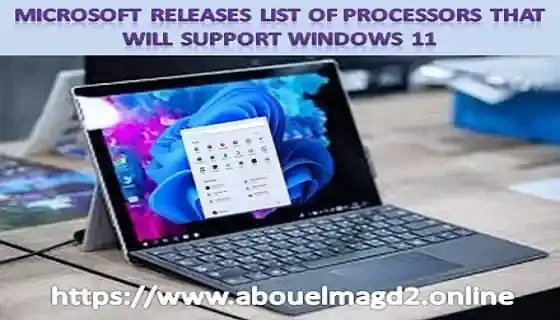8th generation Intel processors and above
On 5/10/2021, Microsoft announced its new operating system, Windows 11, which will arrive later this year as a free upgrade for existing Windows 10 users.
 |
| Microsoft releases a list of processors that will support Windows 11 |
The company also revealed the minimum specifications for its operation
The processor point was the most surprising here, as Windows 11 officially supports only 8th-generation Intel Core processors and newer ones.
and the newer Apollo Lake and Pentium and Celeron processors.
In addition to AMD Ryzen 2000 and later processors, 2nd generation or later EPYC chipsets.
This will exclude millions of devices currently running Windows 10
And even excluding other devices like Microsoft's Surface Studio 2, which the company still sells for $3,499.
Older devices that are not officially supported will encounter a warning during the installation of Windows 11 that an upgrade is not recommended, but the operating system must continue to be installed.
You can find the full list of supported processors on the
Intel processors that support Windows 11:
- 8th Generation Intel (Coffee Lake) processors
- 9th Generation Intel (Coffee Lake Refresh) processors
- 10th Generation Intel (Comet Lake) Processors
- 10th Generation Intel (Ice Lake) processors
- 11th-generation Intel (Rocket Lake) processors
- 11th-generation Intel (Tiger Lake) processors
- Intel Xeon Skylake-SP processors
- Intel Xeon Cascade Lake-SP Processors
- Intel Xeon Cooper Lake-SP Processors
- Intel Xeon Ice Lake-SP Processors
AMD processors that support Windows 11:
- AMD Ryzen 2000
- AMD Ryzen 3000
- AMD Ryzen 4000
- AMD Ryzen 5000
- AMD Ryzen Threadripper 2000
- AMD Ryzen Threadripper 3000
- AMD Ryzen Threadripper Pro 3000
- AMD EPYC 2nd Generation
- AMD EPYC 3rd Generation
It's possible that some older CPUs lower than the above would allow Windows 11 to be installed, but with a caveat, it's not clear how these devices will be supported in the long run.
In addition to the above, the new version also requires support for what is known as TPM (Trusted Platform Module).
It must be a TPM version of 1.2 and above, in addition to a UEFI Secure Boot.
These advances are intended to further improve Windows security and prevent malware and ransomware from tampering with encryption keys and other security components of the operating system.
Microsoft is also requiring a front camera for all Windows 11 devices except for desktop PCs from the next year 2023 onwards.
It's another change that will shape what devices Windows 11 will run on in the coming years.
Finally, to find out if your computer can run Windows 11 or not, download the Microsoft PC Health app.

